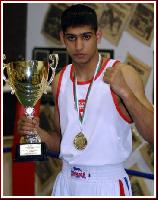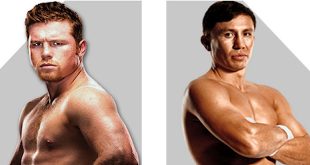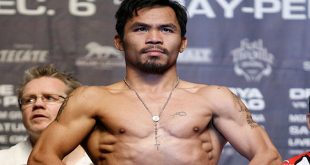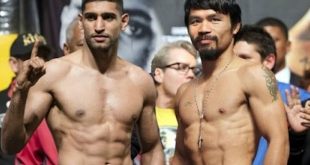| The Janjua Rajput clan are descendants of Prince Arjun, believed by some to have been the ideal warrior. The Janjua are said to have been imbued with Arjun’s belligerent brilliance and are known throughout the ages as a dominant martial force.
Such was their prowess, the Janjua were quickly recruited by the British rulers of India to the Imperial Army. With the servitude |
 © Mike Cleary |
of Imperialism now thankfully an anachronism, Britain is fortunate to have its very own Janjua warrior defending the honour of both his ancestry and his homeland. His name is Amir Khan.
Khan was born in Bolton and rose to prominence as Britain’s sole boxing representative at the 2004 Athens Olympics, surprising even his most ardent followers with a stunning Silver Medal at the age of 17. He had initially believed he was too young to compete but Olympic legislation revealed that he could make the now eminent voyage to Greece.
In 2005 Khan left the amateur ranks by vanquishing his Olympic conqueror Mario Kindelan in his final “unpaid” bout. This was the first boxing match ITV had broadcast for over a decade and was the direct result of the fevered anticipation surrounding Khan’s imminent foray into the professional ranks.
More so than the insipid collection of interchangeable, under-achieving British heavyweights and even the great Joe Calzaghe, Khan had captured the public’s imagination and played a seminal role in boxing’s return to prime time television.
We now arrive at the key note of this article: has Khan’s professional career to date reached the nation’s lofty expectations, or are we simply viewing ITV’s version of Audley Harrison’s ill-fated stint on the BBC?
Upon initial perusal, Khan’s achievements thus far are impressive. He is unbeaten in 11 contests and eight of his opponents have been dispatched before hearing the judges’ scorecards. He is also the IBF Intercontinental Light Welterweight Champion and is currently ranked at 14 by the WBO.
In his most recent outing. Khan stopped Mohammed Medjadji in the first round, the same fighter who had given the excellent prospect Kevin Mitchell a few concerns on route to being finished in the sixth.
Despite these accomplishments, there have been a few disparaging comments and murmurs of discontent from the boxing esoterics. Many have questioned the quality of Khan’s opposition. Usually such criticism would be unfair due to the embryonic nature of Khan’s career, yet if Amir’s intentions to be World Champion by 21 and retired long before 30 are to be realised, the standard of his opponents must improve quickly.
There is also a further troubling fact regarding Khan’s victims to date; between all 11 opponents, they have only managed 38 knockouts. Many construe this statistic as a tacit admission by Amir’s backers of Khan’s fallibility and rumours of Amir possessing a “glass jaw” are rife. Such speculation gained further impetus when Khan was floored (albeit controversially) by Rachid Drilzane, who had never scored a knockout in his 13 fight career.
Outside of the ring, Amir’s progress has been mixed. He injured a pedestrian at a pelican crossing with his new £60,000 BMW convertible and has also come under fire for rather prematurely releasing a book of his life and a DVD of his first nine fights. Whilst Khan cannot be defended against the charge of the former, he appeared genuinely devastated by the event, has avoided any further transgression and seems to have learnt much from it.
With regard to the latter accusations, it would be rather unfair to hold Khan accountable for the actions of the commercial juggernaut that exists relatively autonomously to his own daily life. He is primarily responsible for what he does inside the ring and to taint his character because of the opportunism of his extended entourage is a little harsh.
Furthermore, Khan is involved with many good causes and was recently announced as the NSPCC’s latest ambassador. He also often uses his position as a prominent British Muslim to foster fortified relations between his ethnic group and the wider community.
Amir Khan is an indubitable world-class talent, yet as boxing aficionados are only too aware, such natural gift does not inexorably produce a great fighter. However, the signs that Khan may mature into a fixture on “pound for pound” lists of the future are promising. He has begun to commit fully to his offence and now unleashes his blitzkrieg-like attacks from a far more solid base than he did in his first few contests.
He has also shaken off the callow exuberance that led him to leap upon a wounded opponent yet fail to deliver the telling blows. His defence still needs to be tightened but Amir is a conscientious student of the noble art and will no doubt be aware of this frailty. His ability to take a punch has been questioned but it is cogent to withhold judgement until irrefutable evidence of this supposed weakness has been obtained.
He has proclaimed that he will be a World Champion, and another defining characteristic of Khan’s Janjua clan is that they always do what the say. Amir Khan stands on the cusp of greatness; he must now step up to embrace his legacy.
 Boxing News Boxing News
Boxing News Boxing News






